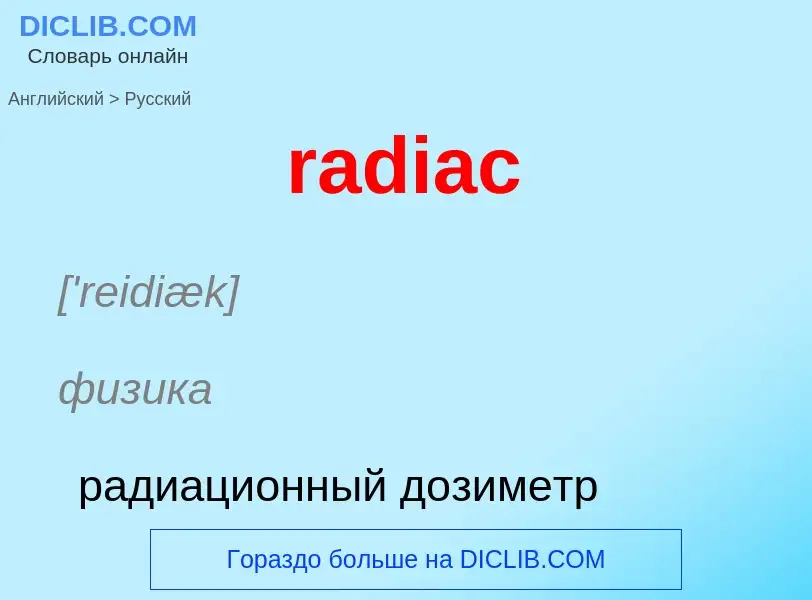Traducción y análisis de palabras por inteligencia artificial ChatGPT
En esta página puede obtener un análisis detallado de una palabra o frase, producido utilizando la mejor tecnología de inteligencia artificial hasta la fecha:
- cómo se usa la palabra
- frecuencia de uso
- se utiliza con más frecuencia en el habla oral o escrita
- opciones de traducción
- ejemplos de uso (varias frases con traducción)
- etimología
radiac - traducción al ruso
['reidiæk]
физика
радиационный дозиметр
существительное
физика
радиационный дозиметр
общая лексика
дозиметрический прибор
['gaigəkauntə]
общая лексика
счетчик Гейгера
физика
счётчик Гейгера
машиностроение
счетчик Гейгера-Мюллера
трубка счетная Гейгера-Мюллера
существительное
физика
счетчик Гейгера
Definición
Wikipedia

A Geiger counter (also known as a Geiger–Müller counter) is an electronic instrument used for detecting and measuring ionizing radiation. It is widely used in applications such as radiation dosimetry, radiological protection, experimental physics and the nuclear industry.
It detects ionizing radiation such as alpha particles, beta particles, and gamma rays using the ionization effect produced in a Geiger–Müller tube, which gives its name to the instrument. In wide and prominent use as a hand-held radiation survey instrument, it is perhaps one of the world's best-known radiation detection instruments.
The original detection principle was realized in 1908 at the University of Manchester, but it was not until the development of the Geiger–Müller tube in 1928 that the Geiger counter could be produced as a practical instrument. Since then, it has been very popular due to its robust sensing element and relatively low cost. However, there are limitations in measuring high radiation rates and the energy of incident radiation.



.jpg?width=200)



![A Radhound Geiger counter measuring radiation emitted by a tree in [[Chernobyl]] A Radhound Geiger counter measuring radiation emitted by a tree in [[Chernobyl]]](https://commons.wikimedia.org/wiki/Special:FilePath/Geiger counter measuring tree at Chernobyl.jpg?width=200)



![G-M pancake detector (right) feeding a microcontroller data-logger (left) sending data to a PC via [[bluetooth]]. A radioactive rock was placed on the detector causing the graph (in background) to rise. G-M pancake detector (right) feeding a microcontroller data-logger (left) sending data to a PC via [[bluetooth]]. A radioactive rock was placed on the detector causing the graph (in background) to rise.](https://commons.wikimedia.org/wiki/Special:FilePath/RM-80 GM with LCD-90 Micro Controller and Wireless Bluetooth.jpg?width=200)
![G-M counters being used in the search for debris of satellite [[Kosmos 954]] G-M counters being used in the search for debris of satellite [[Kosmos 954]]](https://commons.wikimedia.org/wiki/Special:FilePath/Cosmos 954 - Recovery 001.jpg?width=200)
